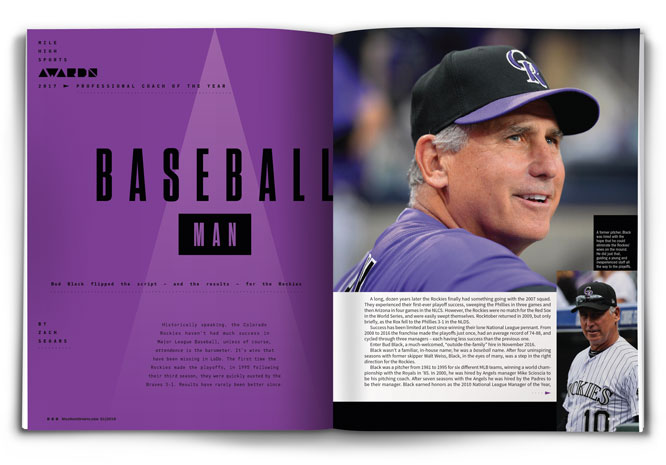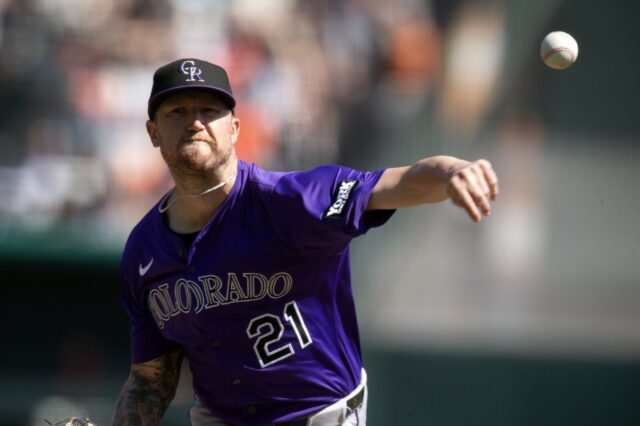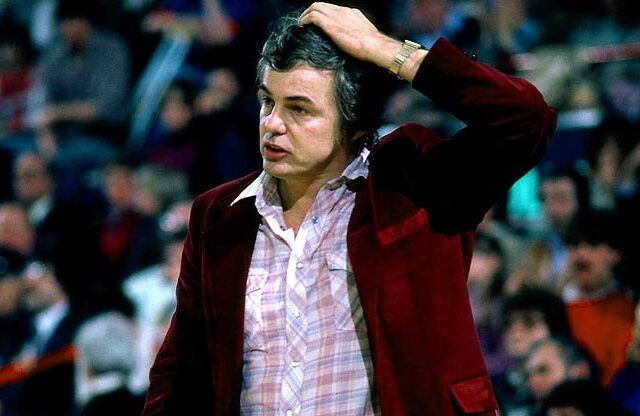This story originally appeared in Mile High Sports Magazine. Read the full digital edition.
Baseball Man
Bud Black flipped the script — and the results — for the Rockies
By Zach Segars
Historically speaking, the Colorado Rockies haven’t had much success in Major League Baseball, unless of course, attendance is the barometer. It’s wins that have been missing in LoDo. The first time the Rockies made the playoffs, in 1995 following their third season, they were quickly ousted by the Braves 3-1. Results have rarely been better since.
A long, dozen years later the Rockies finally had something going with the 2007 squad. They experienced their first-ever playoff success, sweeping the Phillies in three games and then Arizona in four games in the NLCS. However, the Rockies were no match for the Red Sox in the World Series, and were easily swept themselves. Rocktober returned in 2009, but only briefly, as the Rox fell to the Phillies 3-1 in the NLDS.
Success has been limited at best since winning their lone National League pennant. From 2008 to 2016 the franchise made the playoffs just once, had an average record of 74-88, and cycled through three managers – each having less success than the previous one.
Enter Bud Black, a much-welcomed, “outside-the-family” hire in November 2016.
Black wasn’t a familiar, in-house name; he was a baseball name. After four uninspiring seasons with former skipper Walt Weiss, Black, in the eyes of many, was a step in the right direction for the Rockies.
Black was a pitcher from 1981 to 1995 for six different MLB teams, winning a world championship with the Royals in ’85. In 2000, he was hired by Angels manager Mike Scioscia to be his pitching coach. After seven seasons with the Angels he was hired by the Padres to be their manager. Black earned honors as the 2010 National League Manager of the Year, but he was never able to guide the Padres to the playoffs (the ’07 play-in game won by the Rockies, technically doesn’t count), posting a winning record only twice during his eight-year stint. After a rough start in the 2015 season, the Padres fired him. Black was hired just a few months later by the Angels to be a special assistant to GM Billy Epler. After a solid 2016 season for the Angels, the Rockies hired Black to be their manager.
Still, Black, a former pitcher, heading to Colorado? There were plenty who were surprised that a highly thought of baseball man would venture into a place where, well, nobody can pitch.
Spring training didn’t inspire, as the Rockies went 9-10-2 and looked very similar to the 2016 team that finished 75-87. Excitement around the Rockies as a possible dark horse playoff candidate faded in late March, but was quickly reignited once the season began.
By the end of April, Colorado was leading the NL West and owned the second-best record in the National League. The Rockies’ gamble on Greg Holland was paying off as he won NL Reliever of the Month for April and May, and broke José Jiménez’s franchise record for consecutive saves to start a season (16). May was a slight slowdown for Colorado, but at the end of the month they were a mere half game out of first place in the West. The bats started to get rolling as Charlie Blackmon won NL Player of the Month. So far, so good for Black.
But that’s about the point where the Rockies traditionally fade. Black’s test was still to come.
In June, the Rockies rolled to a seven-game winning streak and regained first place in the division. It was the longest winning streak for the franchise since April of 2013. Unfortunately, it was followed with an eight-game losing streak that saw the Dodgers pass the Rockies, who were never able to catch back up. After a rough July and August, the Rockies turned on the jets and finished the season in the NL’s second Wild Card spot at 87-75 – the inverse record from their final year under Weiss.
It was the first winning season since 2010, and the first playoff berth in eight years. The Rockies’ 87 wins were the most since 2009 (92) and the third-most in franchise history. Black’s squad held first place in the NL West for 67 days, the longest stretch in over 20 years. By comparison, Weiss held first place in the NL West for just 54 days over the course of four seasons, and Jim Tracy (2009-12) held first place for 52 days throughout his four-year tenure. The Rockies spent the entire season over .500 for first time since 1999 and improved their defense.
Under Black’s leadership the Rockies saw their best pitching effort in years, too. They allowed their fewest runs per game (4.67) since 2010, and had their lowest ERA (4.51) since 2013. The Rockies’ ERA was 17th-best in baseball which is impressive considering that they play at Coors Field, which has claimed MLB’s highest “park factor” (rate of stats at home vs. the rate of stats on the road) in eight of the last 10 years. Colorado’s pitching staff shut out nine opponents, which tied for second-most in franchise history. Black was hired to help – if not fix – the Rockies’ pitching and he came as close to that as possible, almost immediately.
Amazingly, he did this with a staff that was both injury-riddled and young. Missing for a great deal of the season were staff stalwarts Jon Gray (foot) and Chad Bettis (testicular cancer). In their place stood a cast of rookies – German Marquez, Kyle Freeland, Antonio Senzatela, and Jeff Hoffman, all under 25 years old.
The Rockies’ defense made a huge leap, while the offense took a slight dip but still scored the third-most runs in all of baseball, yielded the second-highest batting average and posted the fifth-highest on-base percentage – all despite being 21st in home runs.
In sum, Black gave the Rockies their best regular season in over two decades. The Rockies played in the toughest division in baseball, with three clubs earning postseason berths, yet the new skipper guided the local nine to its third-best record in franchise history.
The Colorado Rockies aren’t traditionally known – justifiably – as a winning franchise. But Bud Black’s inaugural campaign at Coors Field was nothing short of a “W.”
And for that, he’s the Mile High Sports Professional Coach of the Year.



